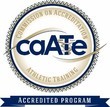- About
- Future Students
- Academics
Academic Resources
- Current Students
My MHU ToolsAdult & Graduate Studies
- Athletics
- Alumni / Give
Learning Outcomes
Athletic Training Education Program Learning Outcomes
Mars Hill University Athletic Training Education Program
Learning Outcomes
Preface
In conjunction with Mars Hill University and in compliance with accreditation standards set forth by the Commission on Accreditation of Athletic Training Education (CAATE), learning outcomes have been drafted and are under review by the MHU ATEP and MHU.
Learning outcomes are designed to show growth and progression through the ATEP in the following areas as outlined by the MHU institutional outcomes:
- Knowledge
- Effective Communication
- Informal, Critical, and Creative Thinking
- Aesthetic Awareness
- Personal Growth and Social Responsibility
Additional and more specific program level learning outcomes have been derived from CAATE standards, the 5th edition of the N.A.T.A.’s Athletic Training Education Competencies, and the Board of Certification Role Delineation Study 6th edition. These outcomes serve as a framework to meet the institutional level outcomes while showing a logical and competent approach to the ATEP curriculum in preparation for a career in athletic training. Each statement is categorized in one of the following domains in a cognitive, psychomotor, and clinical proficiency manner:
- Prevention
- Clinical Evaluation and Diagnosis
- Immediate and Emergency Care
- Treatment, Rehabilitation
- Organizational and Professional Health and Well-Being
Undergraduate Learning Outcomes
Knowledge
1. Graduates of the MHU ATEP will apply knowledge acquired through
study of the athletic training domains:
- Prevention
- Clinical Evaluation and Diagnosis
- Immediate and Emergency Care
- Treatment and Rehabilitation
- Organizational and Professional Health and Well-Being
2. Graduates of the ATEP will be provided the knowledge, skills, and experience necessary to meet entry-level standards of a Certified Athletic Trainer as evaluated and determined by the Board of Certification (BOC), thus preparing graduates for career involving the healthcare of the physically active.
Effective Communication
3. Graduates will demonstrate effective verbal and non-verbal communication skills, including written and computer based techniques, through academic domain study and clinical experiences required by the MHU ATEP curriculum in preparation for a career in athletic training or related field. The academic domain study and clinical experiences include communications with healthcare professionals, patient’s, and peers. In addition, undergraduate opportunities exist for public presentation of learned skills with in the profession of athletic training.
Informed, Critical, Creative Thinking
4. Graduates will show proficiency in critical thinking skills through academic domain study and clinical experiences, particularly in the domains of prevention, clinical evaluation and diagnosis, immediate and emergency care, and treatment and rehabilitation.
Aesthetic Awareness
5. Graduates will appreciate effective strategies to meet the needs of the injured or ill athlete through academic domain study and clinical experiences which include communications with healthcare professionals, patients, and peers. They will further demonstrate a positive working aesthetic within the healthcare community and develop a sense of professional ethics and incorporate these in professional activities.
Personal Growth and Social Responsibility
6. Graduates will demonstrate and implement professional growth and responsibility through involvement with professional organizations, such as the NATA, BOC, and/or state level organizations, completing continuing education, furthering skills, and fostering an appreciation for the field of Athletic Training. Involvement with these organizations will include undergraduate opportunities for public presentation of learned skills to those in the profession of Athletic Training.
 Commission on Accreditation of Athletic Training Education
Commission on Accreditation of Athletic Training Education